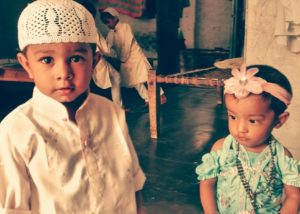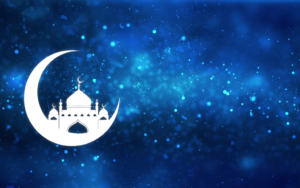Islam is completely foreign to me. I have a decent understanding of a variety of Christian religions, but my only knowledge of any Islamic holiday is a news clip, announcing the first or last day of the holiday and showing prayers. As Ramadan approaches, I realize that I need to learn more, and do better, not only for myself, but for my kids. They need to understand that religions that are different from ours are okay – and what better way can kids relate than over a holiday?

Fortunately, I work with an extremely intelligent Muslim woman who was more than willing to share her thoughts and traditions with me. Her name is Ibtesam and she answered all of my questions honestly and with amazing patience and grace. She made me realize that Islamic holidays are not so different from Christian; they’re about family, community, charity and spirituality.
What Is Ramadan?
To answer the number one question – Ramadan is the 9th month of the Islamic Lunar Calendar. Because it is based on a lunar calendar, the date changes every year. It can occur during any month of the year. This year it starts on May 16th. It lasts for 30 days.
Muslims celebrate Ramadan by fasting from sunup to sundown – for an entire month! This means no food or drink while the sun is up – even water. Pregnant women, children and the sick/elderly are exempt of course. Ibtesam explained that people fast for many different reasons, but at the core, everyone who fasts does so to make themselves better: to gain more patience, to be more humble or grateful, or to be more spiritual and feel closer to God. She told me that when you are conscious and completely aware of what you are eating and drinking, you become more aware of all your actions and the reasons for them.
Ramandan Means Family
Ibtesam described that her family, like most others, breaks fast together for all thirty days of the holiday. She told me this includes extended family: cousins, aunts, uncles, grandparents- everybody. Her eyes lit up as she described seeing her cousins for thirty days straight as a child. She told me her best memories from Ramadan are playing with her cousins after they broke the fast. Most Muslims break their fast by eating a date – the same way the Prophet Muhammad did. That’s followed by drinking water, then eating a meal.
I was laughing uncontrollably as she described the reality of Ramadan; all too common scenarios of setting an alarm 15 minutes before sunrise, then debating five more minutes of sleep or food, only to finally wake up and shovel in food before sunrise. There are stories of mothers shoving food into their teenage kids mouths while they laid in bed, in an effort to get food in their belly before sunrise.
Ibtesam told me that a friend of hers was involved in a minor car accident just at sunset during Ramadan. She wasn’t hurt, but she had to wait for the police and paperwork. Apparently other Muslim passersby saw the situation and brought her food on the side of the road, because they knew how hungry she was. All of the stories she told me had themes of family and charity.
Many Muslims go to services each day during Ramadan. But the holiday of Eid al-Fitr represents the end of Ramadan; it is marked by a special service at the mosque, followed by a carnival, complete with camel rides! Ibtesam described waking up on Eid al-Fitr as a “Christmas morning” feeling. She said you wake with an amazing sense of accomplishment and a feeling of extreme closeness to God. She told me her mom used to dress her and her sisters in matching dress clothes; they would go to services and the carnival, then visit family. She recalled receiving lots of sweets, gifts and money. She had the biggest smile on her face when talking about Eid al-Fitr, and she invited me to bring my kids to her family’s celebration this year. I think I’m going to do it.

I’ve been writing for DMB for several years now. By far, this was my favorite post to write. I learned so much about Ramadan and Islam during my conversations with Ibtesam. Most importantly though, I learned that despite what we might see on the news, Islamic holidays are just like my religion’s holidays, they are about family, charity and spirituality.










